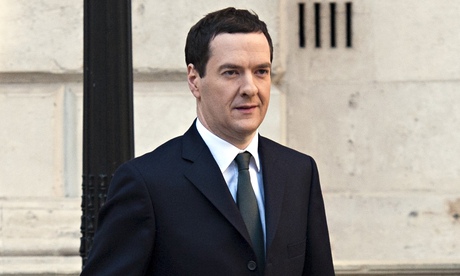
Slicing billions of pounds off the bill for tax credits, paid as a top-up to 5 million families on low incomes, is likely to form the core of a future Conservative government’s attempt to rein back welfare spending.
George Osborne used the autumn statement to reiterate the promise he made to the Conservative party conference to freeze working-age benefits, which will cut £3bn a year from the welfare budget. The plan will see all main working-age benefits, including child benefit, frozen at their post-election levels rather than being uprated in line with inflation.
Tax credits have grown to become one of the biggest programmes within the welfare budget. In 2013-14, they cost £29.7bn, or more than six times the £4.6 bill for jobseeker’s allowance, and nearly double the cost of housing benefit (£17.6bn). The estimated bill is expected to rise by another £400m in the current tax year.
In the autumn statement, George Osborne said: “Total welfare spending is now set to be £1bn a year lower than forecast at the budget and will go on falling as a share of our GDP. And as I’ve made clear I believe we need to freeze working-age benefits for two years – saving billions more.”
A freeze on working-age benefits would knock as much as £350 a year off the income of a low-income family with one child. When Osborne first made his promise to freeze benefits in his September conference speech, party officials indicated that for a couple with one child, each earning £13,000 a year, the cut in tax credits would be £310, with a further £44 taken off child benefit.
For a lone parent with two children, the reduction in income is nearly £500, as the same officials briefed that the family would lose £75 a year in child benefit and £420 in tax credits. Housing benefit is likely to be frozen as well as tax credits, reducing incomes for some of the working poor by even more. The officials justified the freeze by arguing that earnings have grown by 14% since 2007 while most working-age benefits have been uprated by 22.4%.
The precise picture will be complicated by the phasing out of tax credits and their replacement with universal credit. Tax credits will be closed to new applicants in 2016, with the government planning – amid persistent controversy over delays and adminstrative hitches – to move existing benefit claimants over to UC during 2016 and 2017.
Liberal Democrats in the coalition government have until now blocked Conservative attempts to freeze benefits to working-age people, which is why Osborne’s promise is tied to an election victory in May rather than current government policy.
Victoria Todd of the Low Incomes Tax Reform Group said: “Tax credits have been incredibly helpful for people on low incomes, even if they have been dogged by problems such as overpayments.” But while tax credits were one of the Blair/Brown government’s flagship economic policies (Working Families Tax Credit was first introduced in October 1999), in recent years they have come under siege from critics on both the left and the right.
“There are people on the right – such as [Tory peer] Howard Flight – who would just abolish the lot as they reckon wages would adjust automatically. And there are people on the left who see tax credits as a disguised subsidy to employers,” said Ryan Bourne, head of public policy at the Institute of Economic Affairs. He added that while tax credits are “fairly well targeted in that they do go to people on relatively low incomes,” the key problem is that as people earn more and tax credits are withdrawn, the individual faces an effective tax rate of as high as 73% on their additional earnings.

